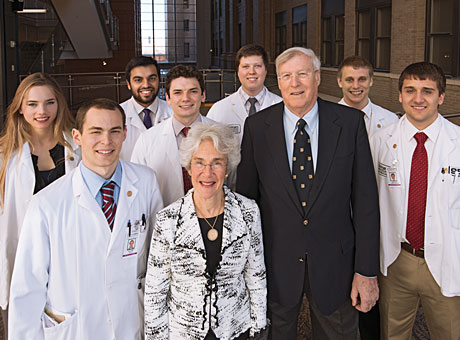
Susie and Gordon Philpott, MD, with annual scholarship recipients, left to right: Kelsey Rebehn, Jacob Witt, Taleef Khan, Lucas Dvoracek, Ross Vyhmeister, James VandenBerg and Miles Bichanich.

Susie and Gordon Philpott, MD, with annual scholarship recipients, left to right: Kelsey Rebehn, Jacob Witt, Taleef Khan, Lucas Dvoracek, Ross Vyhmeister, James VandenBerg and Miles Bichanich.
Meeting the growing need for scholarships is an important challenge for the future and is a priority of the Leading Together campaign.
Gordon W. Philpott, MD ’61, emeritus professor of surgery, is co-chairing the School of Medicine’s scholarship initiative committee. This initiative has secured nearly $22 million in endowed support toward a campaign goal of $40 million for endowed student support. Moreover, very significant annual funds for scholarships have been received.
Gordon and his wife, Susie, have supported their own annual and endowed scholarships. As Gordon explains, “We made a decision to add to the endowed scholarship started by my mother. In addition, my sister, Ann Augustin, and I wanted to make it a major scholarship to provide full support for a student.”
Tom Shane, MD ’06, was the first recipient of the Philpott Family Scholarship, and Kavitha Rajeswari Sivaraman, MD ’10, was the second. Fourth-year student Marshall Strother now holds the scholarship.
“We get to know the endowed scholarship students over a period of years, have dinner with them and meet their friends,” Gordon said. “They even
have invited us to their weddings, so they really become part of the family.”
It is fun to get to meet the new annual scholarship students each year and it keeps us in touch with the school,” Susie added.
Scholarship support reduces debt upon graduation and has an immediate impact on students’ lives. According to the Association of American Medical Colleges, medical students graduating in 2013 had an average of nearly $170,000 of education debt. The average indebtedness of Washington University School of Medicine Class of 2013 graduates was just under $100,000 — more than 40 percent less than the national average.
Scholarships also are key to allowing future generations of students to pursue career paths based on passion, not on potential income.
“When applying to medical schools, I braced myself for the possibility that I would be forced to choose between a school I wanted to attend and a school I could afford to attend,” said second-year student Ross Vyhmeister. “Scholarship funds made it possible for me to have the best of both worlds, enabling me to attend my first-choice school without excessive debt. I am grateful to be part of such a supportive community and look forward to the day when I can donate to a scholarship fund.”